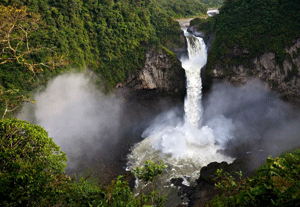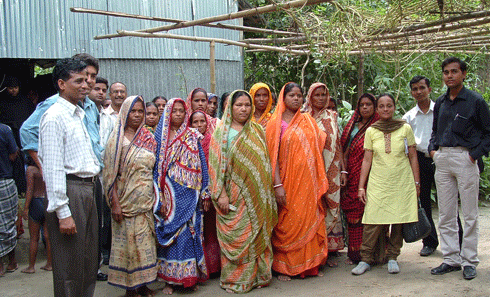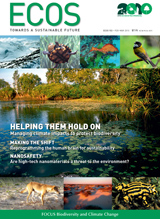
|
Published:
Making the shift: from consumerism to sustainability
The inconclusive outcome of the UN climate conference in Copenhagen last December highlighted one of the dilemmas of sustainable development – humans will often fail to change their behaviour in the face of scientific evidence about its damaging impacts. Alexandra de Blas explores why we do this, and how we might shift from a culture of consumerism to one of sustainability.

|
|
A takeaway, consumer lifestyle contributes to the large ecological footprint of Western countries. Credit: iStockphoto
|
Consumerism has become a way of life in the West, and is rapidly gaining traction in the developing world. But what seems normal today wasn’t always so. Today’s consumerist culture can be largely traced back to the post-World War II years, when it was promoted by the United States government and industry as a solution to prevent the massive war-time economy from receding.
This development was noted in 1955 by US economist and retail analyst, Victor Lebow, when he wrote: ‘Our enormously productive economy demands that we make consumption our way of life, that we convert the buying and use of goods into rituals, that we seek our spiritual satisfactions, our ego satisfactions, in consumption. We need things consumed, burned up, worn out, replaced, and discarded at an ever-increasing rate.’1
Consumerism has led us to a point where humanity now has a global ecological footprint one-third larger than the planet we inhabit.2 According to Professor William Rees, an ecologist at the University of British Columbia and founder of the ecological footprint concept, we are drawing down the natural capital of resources that have accumulated over thousands of years, and using them at a faster rate than they can be replenished. Rees believes that, globally, we are in a state of ecological debt and our footprint can only exceed the biological capacity of the planet for a limited period.

|
|
Ecuador’s breathtaking cloud forest: the country’s new constitution has been worded to enshrine the ‘rights of nature’ Credit: iStockphoto
|
Christopher Flavin, President of the Worldwatch Institute, a leading US environmental think tank, points out in the 2010 State of the World Report3 that more than 6.8 billion people are demanding increasing quantities of resources, decimating rich ecosystems and dumping billions of tonnes of heat-trapping gases into the atmosphere in the process.
‘Despite a 30 per cent increase in resource efficiency, global resource use has expanded 50 per cent over the past three decades,’ he writes. ‘And those figures will continue to soar for decades to come, as more than five billion people, who currently consume one-tenth as many resources as the average European, try to follow the trail blazed by the world’s affluent.’
But all this consumption isn’t necessarily making us happier. According to the report, inequality and the gap between rich and poor are increasing, within nations and between them. Problems such as obesity and time-stress are escalating. The report also notes that key ecological indicators are declining, and climate change threatens to swamp all issues, creating large-scale food shortages, enforced migration and, in some cases, death.4 Other experts warn that the occurrence of failing states is ‘spreading and deepening’ providing a threat to global order and stability.5
Professor Rees and Eric Assadourian, Project Director of the latest State of the World Report and a senior researcher at the Earthwatch Institute, argue that a wholesale transformation of our dominant culture is required if we are to avoid the collapse of human civilisation.
Rees says we must learn from our history as a species, be honest about our unconscious behaviour patterns – which are rooted in our evolution – and understand that we live on a finite planet.
Becoming conscious
According to Rees, three key factors predispose us to our current condition. Human beings, like any other organism, have a biological tendency to fill all the available space – just as a bacterial colony does when it grows in a Petri dish. Our second tendency is to use up all the resources at our disposal, and our third is that, as a species, we are inherently optimistic.
Consequently, human beings develop mythologies and cultural narratives that help us to make sense of the world. Techno-industrial society is no exception. As Rees points out, ‘one [myth] we are completely seduced by right now is the “progress myth” – a vision of global development and poverty alleviation centred on unlimited economic expansion fuelled by open markets and more liberalised trade’. He asserts that perpetual growth is the principal myth giving ‘shape and direction to [economic] life in virtually the entire global village today’.6
The roots of our ecological dysfunction and gross social inequity are essentially beneath perception, Rees argues, and lie deep within the human brain. Our ‘reptilian’ brain stem is responsible for our survival instincts, and our emotions are seated in the limbic system. However it is the cortex, which occupies two-thirds of the human brain,7 that makes us self-aware, rational and intelligent.
Rees proposes that instinct and emotion often override our intellect because the cerebral cortex is a latecomer in the brain’s evolution. ‘Certainly in times of stress, emotion and instinct will trump reason every time, which is why countries often go to war on unreasonable grounds,’ he says.
In fact, Rees claims that our dedication to growth is ‘not driven by the intellect’, but rather the ‘basic survival instincts of the population’.
‘We are naturally discounters,’ he says. ‘We exploit our own short-term self-interest at the expense of the long-term interests of ourselves, let alone our children or grandchildren.’
Once humans acquire a particular world view, he contends, ‘we tend to stick to it’. It’s a way of operating that has had evolutionary advantages in the past but is problematic during times of great change. As Rees sees it, our dominant cultural narrative – the growth-oriented progress myth – is preventing us from adapting to the changes in our environment today.
But, just as a mutated gene can be selected out of a population by a changing environment, so too can a maladapted cultural trait or ‘meme’. (A meme is any cultural idea that can spread or evolve). ‘We [as a race] will be “selected out” if we stick to the cultural memes that are driving us today,’ says Rees.
To survive, he concludes, we must assert our capacity for ‘consciousness, reasoned deliberation and willpower’ to ‘re-write the “myths we live by” and articulate the necessary conditions for sustainability’.
Re-writing the consumption myth
For many in the West, consumerism has become a means of bringing value and social acceptance to their lives. This is why, argues Eric Assadourian, we need to consciously ‘reject consumerism – the cultural orientation that leads people to find meaning, contentment and acceptance through what they consume – as taboo, and establish in its place a new cultural framework centred on sustainability’.
In this framework, he says, it would become ‘natural’ for individuals and society to make choices that minimise ecological damage and, better still, restore the Earth’s ecological systems to good health. While new technologies and government policies are usually seen as the key drivers to stimulate a transition to sustainable societies, Assadourian sees cultural shift as a more fundamental priority, describing it as a change that would ‘radically reshape the way people understand and act in the world’.
The shift to a new sustainability paradigm, he suggests, will take decades of effort by ‘cultural pioneers’ influencing key institutions such as education, business, government, the media, social movements and religious traditions. According to Assadourian, no generation has previously achieved a cultural transformation on this scale.
The 2010 State of the World Report demonstrates that this transformation is already happening. While it gives examples of industries that have made our lifestyle less sustainable – such as bottled water, fast food and pet food – it also profiles many initiatives that are taking us along a healthier path for the future.
One example is the ‘human buses’ for children to commute to primary school. In Lecco, Italy, 450 elementary school students walk with a ‘driver’ and parent volunteers along 17 routes to 10 different schools each day. Since their introduction in 2003 these ‘piedibuses’ have eliminated more than 16 000 kilometres of driving, cut greenhouse gases and other pollutants, and provided exercise for the children. A number of Australian states also have a ‘walking school bus’ program.
On the legal front, the report explores new concepts such as Earth’s jurisprudence. In Ecuador, rights for the planet were incorporated into the country’s new constitution in 2008 — providing a strong impetus to safeguard its ecosystems and people. The constitution now states: ‘Nature or Mother Earth, where life is reproduced and exists, has a right to exist, persist, maintain and regenerate its vital cycles, structures, functions and its evolutionary processes’ and that ‘every person, community and nation will be able to demand the recognition of nature’s rights before public institutions’.
In the realm of religion, faith-based organisations are starting to use their influence to address environmental issues – for example, printing ‘green bibles’ that encourage congregations to conserve energy, invest wisely and ‘protect God’s creation’.
Another example are emerging enterprises based on social justice principles, which have gone a long way to challenge the assumption that profit should be the primary purpose of business. When Muhammad Yunnus first asked established bankers to lend money to poor, illiterate women in Bangladesh, they replied that poor people ‘are not creditworthy’.
Yunnus’s Grameen Bank now lends US$1 billion annually to 8 million borrowers, and 99 per cent of the loaned funds are repaid on time. Microfinance has now spread worldwide.
While the task of creating a new culture of sustainability appears formidable, Muhammad Yunnus, in the foreword to the 2010 State of the World Report, urges us to think beyond our current narrow world view: ‘You may not agree with every idea in this book,’ he writes, ‘but it’s hard not to be impressed by ... [its] boldness’.

|
|
The Grameen Bank’s microfinance loans have enabled millions of the world’s poor to work and live with dignity. Credit: Grameen Bank
|
1 Lebow V (1955) Price competition in 1955. Journal of Retailing, XXXI(I). See http://hundredgoals.files.wordpress.com/2009/05/journal-of-retailing.pdf
2 See www.footprintstandards.org/
3 Worldwatch Institute (2010) 2010 State of the World, Transforming Cultures from Consumerism to Sustainability. WW Norton & Co, New York.
4 Global Humanitarian Foundation (2009) ‘The anatomy of a silent crisis’. Human Impact Report – Climate Change.
5 Brown L (2009) Plan B 4.0: Mobilising to Save Civilisation. WW Norton & Co, New York. www.earthpolicy.org/index.php?/books/pb4
6 Rees WE (2002) Globalization and sustainability: conflict or convergence? Bulletin of Science, Technology and Society 22 (4): 249–268.
7 Rees W (2008) Toward sustainability with justice: are human nature and history on side? Chapter 6 in Sustaining Life on Earth: Environmental and Human Health through Global Governance. Colin L. Soskolne, Editor-in-Chief. Lexington Books.



